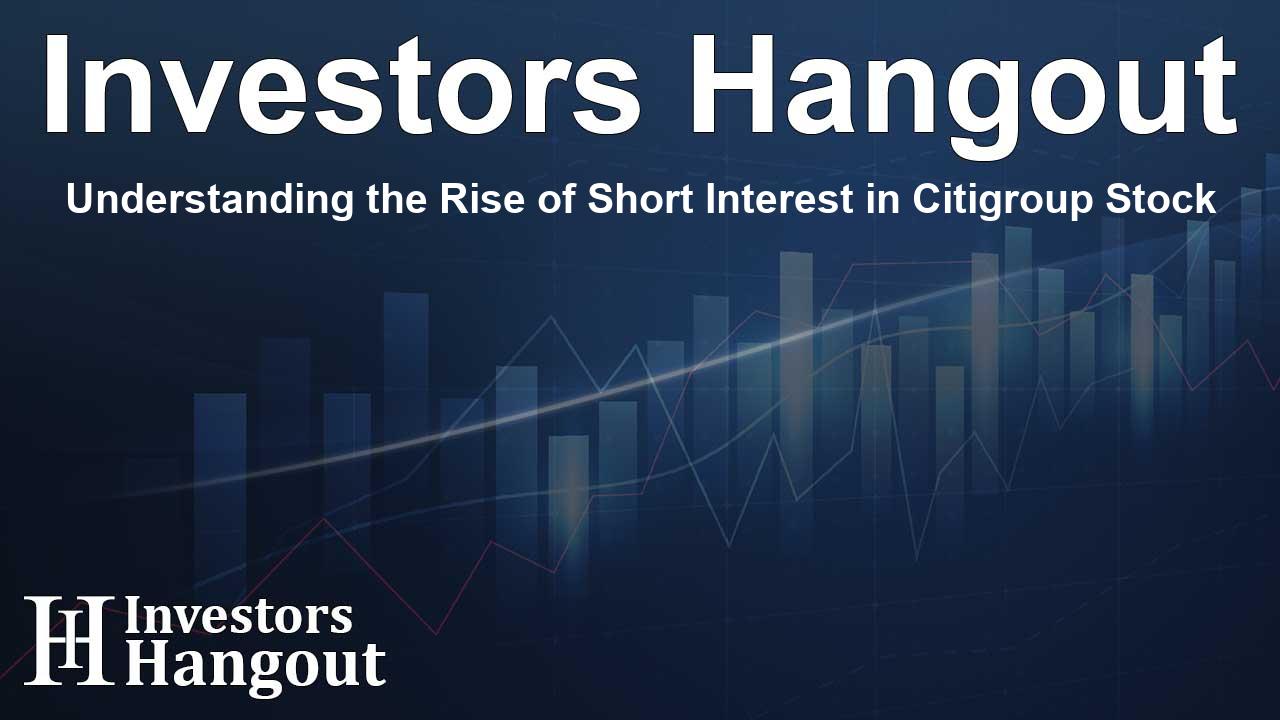Understanding the Rise of Short Interest in Citigroup Stock

Insight into Citigroup's Short Interest Trends
Recently, there has been a notable increase in short interest for Citigroup Inc (C). The percentage of shares sold short has increased by 12.94% since the last report, with approximately 35.36 million shares sold short. This represents about 1.92% of all available shares in the market for trading. Based on current trading volumes, the average time it would take traders to cover or close out these short positions is around 2.26 days.
Why Monitoring Short Interest is Essential
So, why should investors care about short interest? Short interest reflects the number of shares that had been sold short but have yet to be repurchased. Traders engage in short selling when they believe that the price of a stock will drop. This process involves selling shares they do not own, thus creating a position from which they hope to profit as the stock price declines. If the price rises, however, traders may incur losses.
The Indicator of Market Sentiment
Tracking short interest is crucial as it serves as a barometer for market sentiment regarding a specific stock. An uptick in short interest could indicate that investors are feeling more bearish about the stock's future trajectory. Conversely, a decline in short interest may suggest a bullish outlook among traders.
Trend Analysis: Citigroup's Short Interest Over Time
The growth in the short interest for Citigroup, as evidenced by recent data, doesn’t necessarily imply that the stock price will fall in the short term. Nonetheless, it's a vital statistic for traders who aim to gauge market dynamics. When short interest increases, it's an indication that traders are taking positions that suggest expectations of a decline, and they need to be aware of that sentiment.
Interpreting the Graph of Citigroup's Short Interest
Despite the increase in short interest, it is essential to analyze the accompanying trends through charts and graphs that detail the fluctuations over the past few months. These trends enable investors to visualize trading behavior and make informed decisions. Understanding the overall direction gives further clarity to the reasoning behind these trades.
Citigroup in Comparison with Its Peers
Comparing Citigroup's short interest with that of similar companies offers valuable insights. Peer comparison is a recognized strategy among investors and analysts to evaluate performance relative to competitors. A company's peer group consists of those companies operating in the same industry with similar characteristics, including size, growth, and financial structure. Analyzing these peers can provide context about the solid or weak positions of a given stock in the market.
Citigroup's Peer Group Short Interest Analysis
Recent evaluations reveal that Citigroup’s average short interest as a percentage of float is higher than its peers, sitting at 0.84%. This suggests that investors are exhibiting a greater level of concern over Citigroup's performance in comparison to many of its counterparts within the same industry.
The Impact of Short Interest on Stock Performance
Interestingly, contrary to conventional belief, rising short interest can sometimes serve a bullish purpose for a stock, particularly in specific market scenarios. Investors might want to keep an eye on broader market conditions and respective financial strategies to assess potential outcomes. These insights can lead to informed trading decisions, whether short or long-term plays are more appropriate.
Frequently Asked Questions
What does it mean when short interest increases?
An increase in short interest suggests that more traders believe the stock's price will decline, indicating bearish sentiment in the market.
How is short interest calculated?
Short interest is calculated by dividing the total number of shares sold short by the total number of outstanding shares, then multiplying by 100 to obtain a percentage.
Why is short interest significant for traders?
Traders utilize short interest data to evaluate market sentiment and anticipate potential price movements, helping them make informed trading decisions.
What should investors do when short interest is high?
When short interest is high, investors should analyze the reasons behind it and consider market trends, as it could influence their trading strategy.
Can high short interest ever be a bullish signal?
Yes, a significant short interest can sometimes lead to a short squeeze, which may push the stock price higher if positive news or price movements occur, triggering shorts to cover their positions.
About The Author
Contact Evelyn Baker privately here. Or send an email with ATTN: Evelyn Baker as the subject to contact@investorshangout.com.
About Investors Hangout
Investors Hangout is a leading online stock forum for financial discussion and learning, offering a wide range of free tools and resources. It draws in traders of all levels, who exchange market knowledge, investigate trading tactics, and keep an eye on industry developments in real time. Featuring financial articles, stock message boards, quotes, charts, company profiles, and live news updates. Through cooperative learning and a wealth of informational resources, it helps users from novices creating their first portfolios to experts honing their techniques. Join Investors Hangout today: https://investorshangout.com/
The content of this article is based on factual, publicly available information and does not represent legal, financial, or investment advice. Investors Hangout does not offer financial advice, and the author is not a licensed financial advisor. Consult a qualified advisor before making any financial or investment decisions based on this article. This article should not be considered advice to purchase, sell, or hold any securities or other investments. If any of the material provided here is inaccurate, please contact us for corrections.
